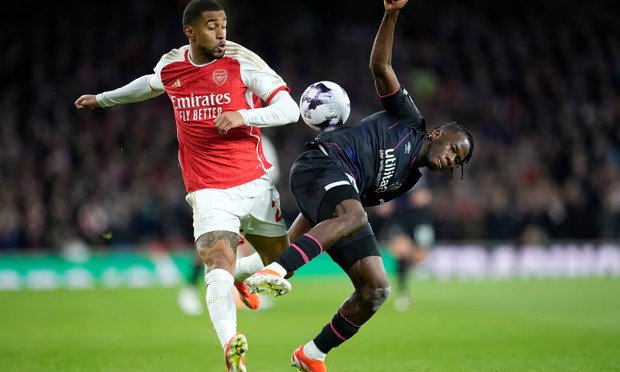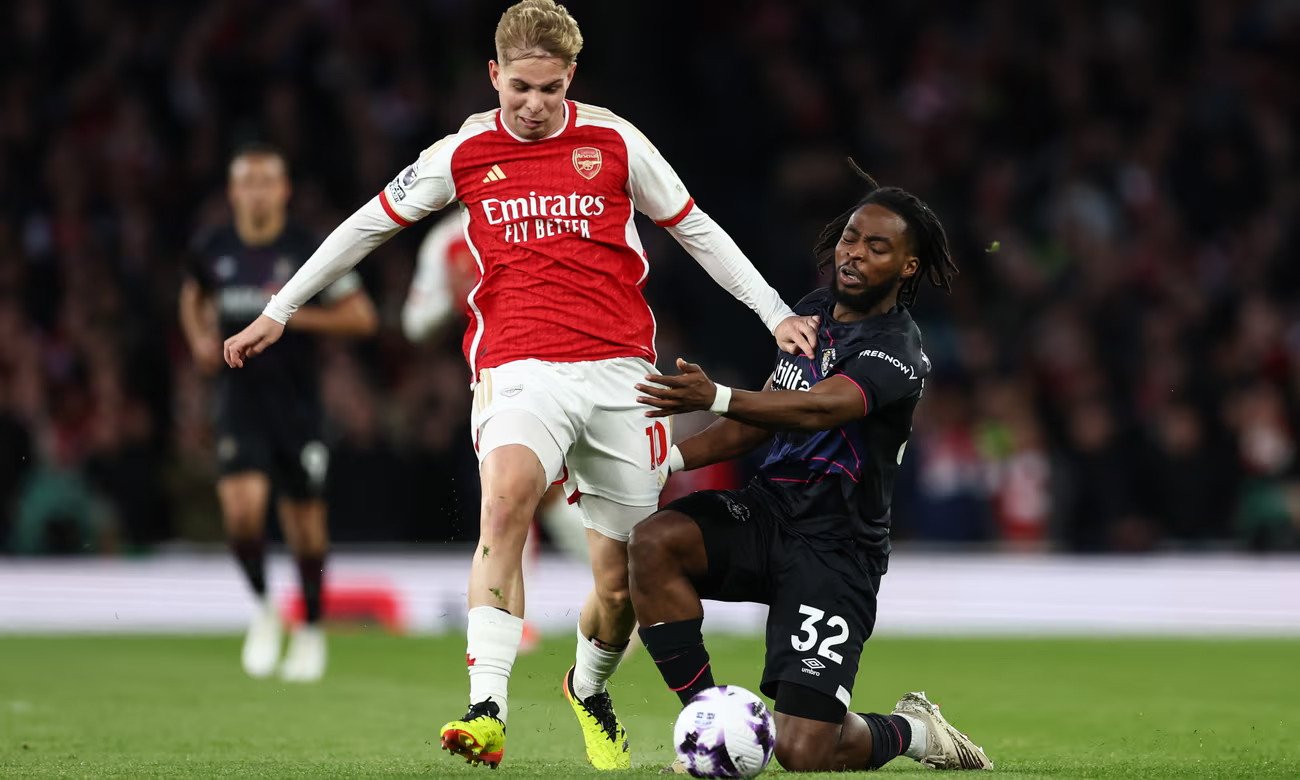Finishing to the tune of Status Quo’s classic Rockin’ All Over the World, one of the Emirates Stadium’s favourite songs praises “Saka and Emile Smith Rowe.” It was encouraging to see the balance move slightly on a night that never really deviated from the conventional, as one of those players had contributed a great deal more to the song’s heavy lifting over the previous two years. While there was little reason for celebration when Arsenal defeated a weak and depleted Luton, it did indicate that the supporters of the club are not beating a dead horse by praising two expensive domestic players at the same time.
More than anything, Smith Rowe’s depressing string of ailments is to blame for his transition from a resolute sure thing to a bit-part enigma. After undergoing groyne surgery last season, he found that Arsenal, who had looked up to him during two years of dullness, had moved on without him. Arteta has used him infrequently because he has never been the sharpest of rotators. This was Smith Rowe’s third Premier League start of the year; he had not played 20 minutes of league football since January.
Therefore, it was fortunate to witness him have an impact in a game that will not be remembered much but moved Arsenal three points closer to a prize that seems increasingly likely. With his sheer determination, Smith Rowe put their first goal in the bag; he executed the second with admirable poise, and it will not have hurt to have had a direct influence on changing the tone of a low-key evening for a 23-year-old who clearly thrives on being adored.
By leading Arsenal to a dull but potentially game-changing point against Manchester City, Arteta had demonstrated that, if there were any gods overseeing the title battle that disapproved of his beliefs, they most definitely had others. It appeared that there was less of a need to revert to previous styles when playing against an injured Luton team that was missing half of its lineup from the defeat at Kenilworth Road four months prior. If Arsenal makes it through, that match—which was dramatically decided by Declan Rice’s header—may also be considered vital, but there wasn’t much hope for an identical comeback this time.
That sentiment, though, may have been contradicted by the reality that Luton, despite their difficulties, has a remarkable ability to stay in games. It was also somewhat mitigated when both teams’ teamsheets had a patchwork component. The fixture schedule played a major role in Arteta’s decision to deploy deputies; the “A” team felt that Bayern Munich’s visit the following week was more acceptable, but doing so ran the danger of making it harder to achieve the usual levels of rat-a-tat togetherness at Emirates Stadium.

Arsenal was nowhere near them for over twenty-four minutes as they struggled to find their rhythm in an atmosphere that, by the norms of this place, was a sleepy one. It is impossible to criticise Reiss Nelson’s dedication to Arsenal—his contract expires after this season—but his right-sided invasions will never elicit the same cheers that typically accompany Bukayo Saka’s early forays onto Arsenal land. For the first time since July 2020, Nelson was starting a league game; in some ways, he was in a boat comparable to Smith Rowe’s, but Nelson has never completely cemented himself as his colleague did.
After Arsenal’s deputies laboured, Smith Rowe increased the pressure by nipping at Pelly Ruddock Mpanzu’s heels and winning possession, giving Luton cause for quiet satisfaction. It was the energy that Martin Ødegaard delivered a thunderous conclusion seconds later, and it was something Arteta swears by. Ødegaard was surpassed by Ross Barkley in the December meeting, which could provide Smith Rowe with insight into unrealized potential; the Luton midfielder was neat once more, indicating he would start in a top-half team with ease; however, Ødegaard demonstrated once more that he is the best and most reliable playmaker in the division by a significant margin.
Perhaps Smith Rowe will make another clue that he can reach such heights at some point. Not long after Ødegaard’s score, he was in his own penalty area, swatting away onlookers with a cross from Andros Townsend. Then, following a quick play, he forced a deft save from Thomas Kaminski. Not long after, he had the play of the night: a charge to the byline and a calm, purposeful centre that Daiki Hashioka unintentionally turned into his own goal.
That was about it, but Smith Rowe gained the manager’s approval once again by extending to stop Barkley from receiving a long pass. In a second half devoid of highlights, Arteta was not given any encouraging signs that his days of exceptional promise, when he outperformed everyone against Aston Villa and humiliated Tottenham, would return anytime soon. However, Smith Rowe’s labour had a motivation, a goal, and a final result that might potentially bring in more money. On Tuesday, Arteta remarked, “There are times when it takes a second to change a football club’s history.” Maybe now he’ll be inclined to give Smith Rowe a couple more of them.


